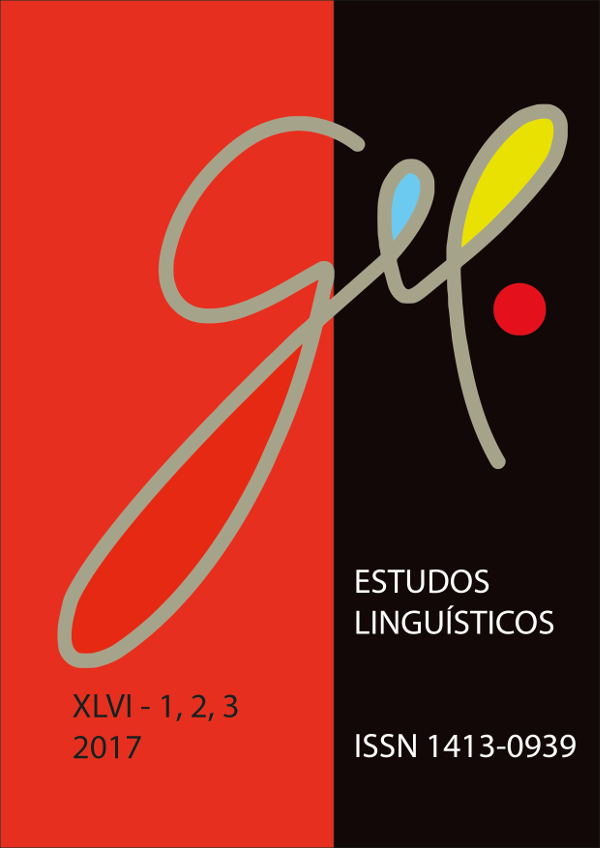The printed journalistic discourse and the "spectacle" of democracy
DOI:
https://doi.org/10.21165/el.v46i3.1564Keywords:
persuasion, interpersonal relationship, Critical Discourse AnalysisAbstract
In this article, we try to present the results of a research that aims at investigating, analyzing and describing the structures responsible for the establishment of interpersonal relationships and their intersections with persuasion in Sao Paulo newspaper reports establishing as a particular approach publications related to unfolding political crisis in Brazil. We will argue that the contemporary process of “politicization of media” on the fact that the media go to perform supposedly as institutions that fulfill a vital social function, properly the critically reveal what was hidden in the political world, emerges in discursive materiality by through various strategies different camouflage of persuasion and control. Building the illusion of objectivity and impartiality, these strategies strengthen the enforcement of certain ideologies and the establishment of hegemonic consensus.
Downloads
References
BOURDIEU, P. Outline of a theory of pratic. Cambridge: Cambridge University, 1991.
CASTELLS, M. A era da informação: economia, sociedade e cultura. Tradução de Klauss Gerhardt. 6. ed. São Paulo: Paz e Terra, 2008.
COURTINE, J. J. Os deslizamentos do espetáculo político. In: GREGOLIN, M. R. V. (Org.). Discurso e mídia: a cultura do espetáculo. São Carlos: Claraluz, 2003. p. 49-66.
CHARAUDEAU, P. O discurso das mídias. São Paulo: Contexto, 2006.
FAIRCLOUGH, N. Critical Discourse Analysis: the critical study of language. London and New York: Longman, 1995.
______. Critical Discourse Analysis: papers in the critical study of language. London and New York: Longman, 1997.
______. Discurso e mudança social. Brasília: Editora da Universidade de Brasília, 2001.
______. Analysing Discourse: textual analysis for social research. London: Routledge, 2007.
HALLIDAY, M. A. K. An Introduction to functional grammar. London: Hodder Arnold, 2001.
HABERMAS, J. The theory of communicative action. Reason and the rationalizalion of society. Boston: Beacon Press, 1984.
LIMA, F. F. Persuasão e constituição de consensos na mídia impressa paulista: o noticiário sobre as eleições. 2013. 259 f. Relatório Final de Pós-Doutoramento – Faculdade de Filosofia, Letras e Ciências Humanas, Universidade de São Paulo, São Paulo, 2013.
MARSHALL, L. O jornalismo na era da publicidade. São Paulo: Summus Editorial, 2003.
MARTIN, J. R.; WHITE, P. R. R. The language of evaluation: appraisal in English. New York/Hampshire: Palgrave Macmillan, 2005.
PIOVEZANI FILHO, C. F. Política midiatizada e mídia politizada: fronteiras mitigadas na pós-modernidade. In: GREGOLIN, M. R. V. (Org.). Discurso e mídia: a cultura do espetáculo. São Carlos: Claraluz, 2003. p. 49-64.
PERELMAN, C.; OLBRECHTS-TYTECA, L. O tratado da argumentação: a nova retórica. São Paulo: Martins Fontes, 1996.
RAMALHO, V.; RESENDE, V. M. Análise de discurso crítica. São Paulo: Contexto, 2006.
THOMPSON, J. Mídia e modernidade: uma teoria social da mídia. 10. ed. Petrópolis: Editora Vozes, 1998.
VAN DIJK, T. A. Discurso, poder y cognición social. Cuadernos, 2, Año 2. Maestría en Lingüística. Escuela de Ciencia del Lenguaje y Literaturas. 1994. Disponível em . Acesso em: 6 jun. 2007.
______. Discurso e poder. São Paulo: Contexto, 2008.
WHITE, P. Valoração: a linguagem da avaliação e da perspectiva. Linguagem em (Dis)curso, Tubarão, v. 4, n. esp., p. 178-205, 2004.
WODAK, R. Do que trata a ACD: um resumo de sua história, conceitos importantes e seus desenvolvimentos. Linguagem em (Dis)curso, Tubarão, v. 4, n. esp., p. 223-243, 2004.



